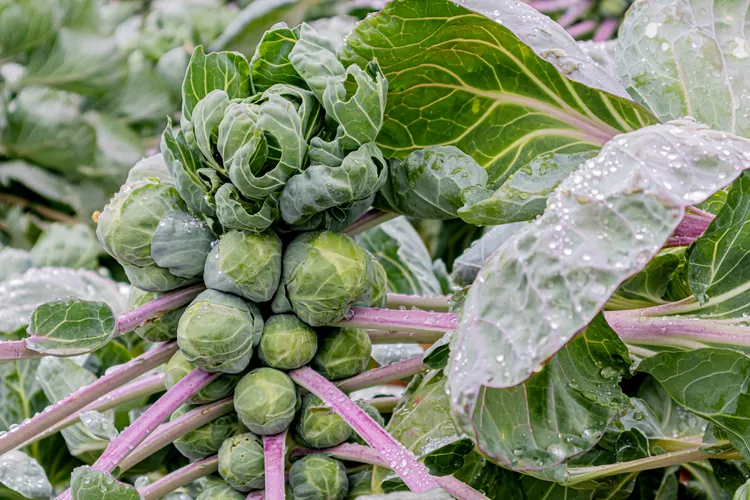10 Best Brussels Sprouts Companion Plants for Natural Pest Control

Like other brassica vegetables, Brussels sprouts can be prone to cabbage loopers, flea beetles, and many other pests. However, if you grow the right Brussels sprouts companion plants in your garden, you can naturally repel these troublesome insects. Grow the following vegetables, herbs, and flowers near Brussels sprouts this season to keep pests out of the garden and boost your harvest of blemish-free produce.
Alliums
Garlic, onions, and chives contain sulfur compounds that give alliums their intense flavor and aroma. Those sulfur compounds also repel pests like aphids, slugs, and cabbage loopers from neighboring Brussels sprouts. In addition, low-growing alliums won’t compete with Brussels sprouts for sunlight, and alliums and Brussels sprouts have similar growing needs.
Dill
Dill may look like a delicate plant, but it’s one of the best crops for natural pest control. Dill flowers attract an assortment of beneficial insects that feed on aphids, cabbage loopers, and other pests, helping to keep Brussels sprouts bug-free. Beneficial insects are particularly fond of dill flowers, so plant more dill than you need for fresh herbs and let some of your plants bolt.
Mustard
When choosing companion plants, it’s usually a good idea to avoid growing similar plants together, because plants in the same family can be vulnerable to the same pests. Since mustard and Brussels sprouts are both brassicas, it stands to reason that these plants won’t grow well together. However, if you plant mustard near Brussels sprouts, mustard acts as a trap crop for pests and lures insects away from the sprouts.
Beets
Beets and other root vegetables grow underground. Pairing beets with Brussels sprouts can boost the productivity of your garden and help you harvest more veggies in a small space. While you’re waiting for your slow-growing Brussels sprouts to ripen, succession plant and harvest a few crops of beets in the shade of the Brussels sprouts.
Marigolds
Marigolds are famous for their pest-repelling properties. They can deter deer, rabbits, and an assortment of destructive insects. Aside from their ability to discourage pests, marigolds are attractive plants that add much-needed color to drab vegetable beds. French marigolds are particularly useful for pest control. Dwarf marigold varieties are available for grow in small spaces and container gardens.
Chamomile
Chamomile plants are typically grown for teamaking, but they’re also handy for keeping garden pests at bay. Many beneficial insects, including parasitic wasps and hoverflies, are drawn to chamomile flowers, and interplanting chamomile with Brussels sprouts can reduce cabbage loopers and other pests. Both Roman and German chamomile are useful for pest control; German chamomile grows as an annual, while Roman chamomile is a perennial.
Thyme
Thyme is typically cultivated in herb gardens and pots as an edible herb, but it can also be used as a flowering groundcover for weed suppression. Regardless of the type of thyme you grow, it is an exceptional plant to keep for pest problems and is known to hinder cabbage moths and other pests that prey on Brussels sprouts. Thyme grows as a perennial in most areas, and it doesn’t need much water, so you may want to grow it in a large pot beside your vegetable patch.
Spinach
Spinach is a cold-weather vegetable that grows best in chilly spring and autumn gardens. Interplanting spinach with Brussels sprouts can boost your harvest yields by providing fresh spinach leaves while you wait for your harvest of sprouts. Spinach and Brussels sprouts also have similar growing needs, and spinach benefits from the light shade cast by taller Brussels sprouts.
Geraniums
Pink, red, or white geraniums are a garden favorite for their showy flower colors, which are often displayed in hanging baskets and window boxes. Zonal geraniums can also be grown near vegetable gardens for pest control purposes. Like other companion plants, geraniums deter pest insects with their strong scent, and they’re particularly good at repelling Japanese beetles and cabbage worms.
Radishes
Fast-growing radishes can be slipped into empty soil beneath slow-growing crops to boost a garden’s growing capacity. Radishes grow well in the light shade beneath Brussels sprouts, and they offer other benefits. Radish leaves are particularly attractive to flea beetles; planting radishes near Brussels sprouts can distract these pesky bugs and safeguard your sprout harvest.